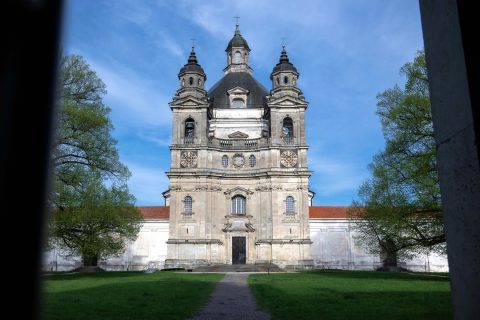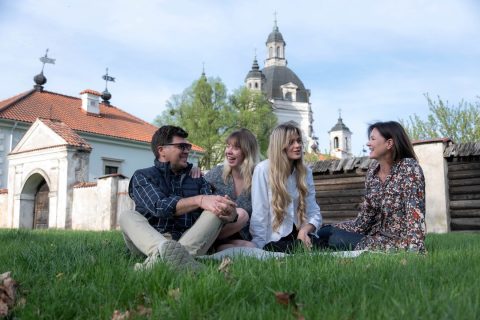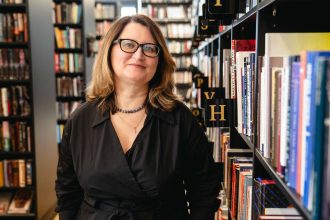This spring, the artistic director of the Pažaislis Festival, Edgaras Montvidas, shared a touching memory in an interview with Elvina Baužaitė, “I remember, when I was a student at the Juozas Gruodis Conservatory in Kaunas, I was searching, exploring, and that’s how I ended up in Maestro Giedrius Kuprevičius’ lectures at Vytautas Magnus University. But the greatest influence on me came from the lectures/music making in his garden in Žaliakalnis. It was there that I first heard Alexander Scriabin’s Poem of Ecstasy, which has remained one of my favorite compositions. Encounters with music like that can be life-changing in the best way. We try to fulfill that mission.”
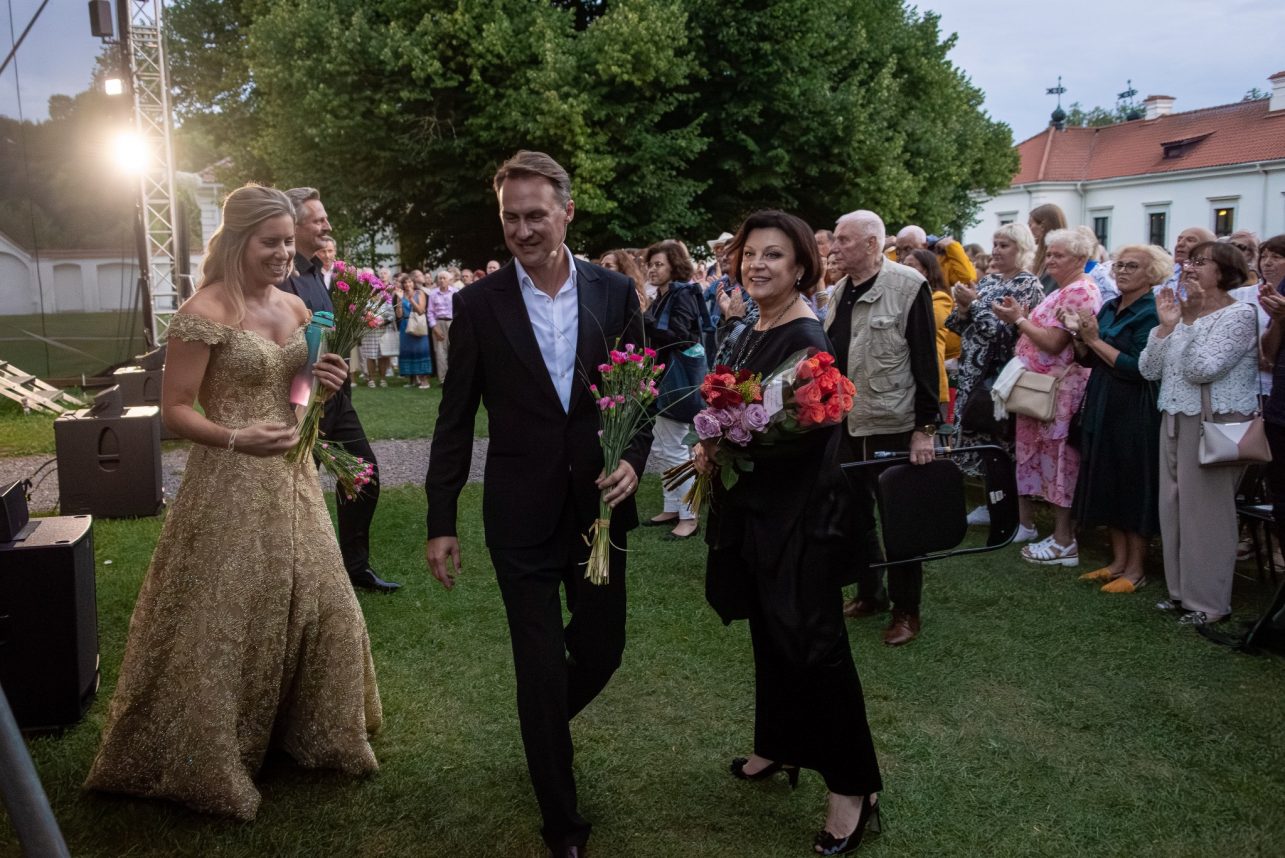
This tenor’s sentiment essentially aligns with the early days of the festival, when opportunities were few, but the desire was boundless. It is precisely that desire and the belief that one must share what they have gathered that seem to radiate from this deeply engaged person’s eyes and heart. Edgaras Montvidas has been the artistic director of the festival for the past five years, but since he has long lived in London, he mostly communicates with the rest of the small team based in Kaunas remotely. He responded to my questions while on a train en route to Switzerland.
What does the Pažaislis Music Festival mean to you personally? What kind of sentiments do you have toward it? Which concerts have left a lasting impression?
I made my debut at the Pažaislis Music Festival while still a student. Since then, it has become a tradition to perform at this festival almost every year. Later, the festival organizers simply gave me the freedom to suggest programs for concerts. That’s how I brought several of my colleagues from abroad and introduced lesser-known pieces to Lithuanian audiences, including concert versions of operas. So, it somehow feels both logical and symbolic that I became the artistic director of this festival, although my position is far from symbolic.
Thirty years is a solid anniversary for any cultural institution. What do you think has contributed to the longevity and success of the Pažaislis Music Festival?
The uniqueness of Pažaislis is a symbiosis between music, architecture, and nature. The space for the big concerts is amazing. The festival, which began as a central Lithuanian event, has now transcended the walls of Pažaislis Monastery to become one of the most prestigious and largest festivals in Lithuania. I would also say that in terms of scope, it is the longest-running art festival, the concert program lasts for as long as three months.
Over the past three decades, several generations have grown up, and for many, it has become customary to welcome and bid farewell to summer with the Pažaislis Festival. However, we don’t simply rely on momentum – we continuously seek new concert spaces, and new musical forms, and strive to engage new audiences with original sounds. Thanks to the festival, more than one architectural site has been brought back to life. Today, the festival is being discovered by an increasing number of internationally renowned performers and is gaining recognition outside of Lithuania as well.
By the way, I want to stress that this is a festival of diverse music. Although it is dominated by classical music, we try to include other professional music in the program. Our concert menu consists only of the highest quality gourmet dishes.
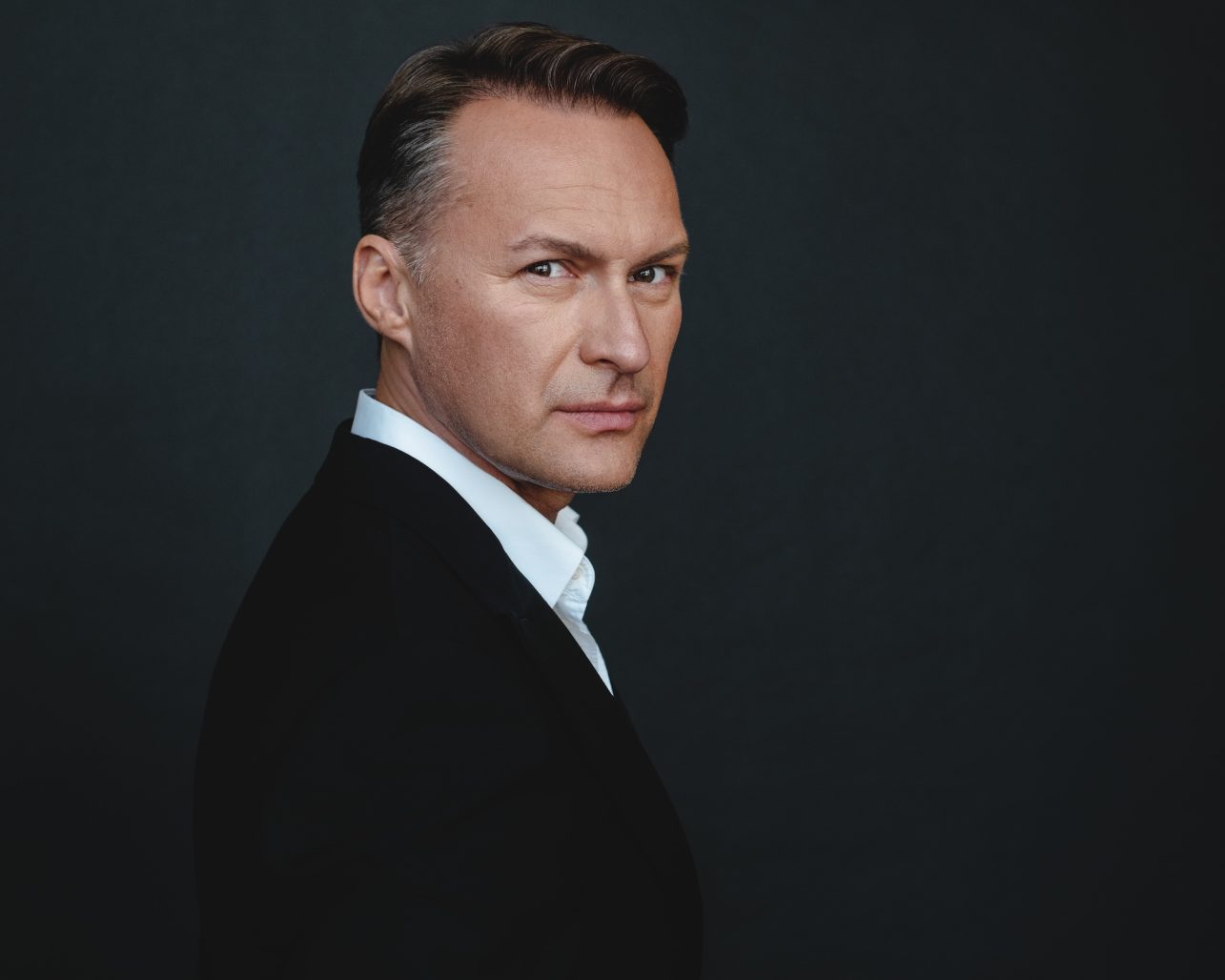
Today, we have even too much music and entertainment, and fashions change overnight. What makes classical music relevant and valuable? What can it offer the 21st-century listener that other genres might not?
There is a need for music and entertainment, and there can never be too much of it. Quality, though, is another issue. The Lithuanian public is sophisticated, and you can’t offer it whatever. Every year all sorts of festivals indeed sprout like mushrooms after the rain, and everyone is trying to find a place under the sun. There is a lot of competition, especially for a small market like Lithuania. Time is the best judge, some stay, others don’t…
Classical music is at the origin of all current musical styles (jazz, electronic, pop, hip-hop, etc.). What has survived for several centuries is more than time-tested. Listening to live music performed by an orchestra, for example, is an invaluable experience. I think all genres are valuable, and I certainly wouldn’t underestimate good pop or jazz music. But classical music needs some maturity, some preparation. And here we also have the answer – we organize concerts for the whole family so that children can grow up surrounded by music and it would not seem alien to their little ears. We do not impose but gently invite them to wade into the ocean of classical music sounds.
The stereotype that classical music is a closed-off, somewhat elitist world is still very much alive. How does the Pažaislis Festival manage to combat this stereotype?
As I mentioned, we are raising a new generation of listeners. We speak to audiences with different tastes in their own language and offer a variety of experiences. Many people believe that opera or classical music concerts are only meant for the elite. Well, who exactly is the elite? That’s a broad question. To me, a full courtyard at the Pažaislis Monastery during a concert – those people are the elite. Bright-faced, open-minded, critical thinkers, tolerant, and far-sighted – our audience is elite.
It is very important not to be afraid, to take risks, to try, to taste. And then, once you get to know classical music, it will become a part of your life. It is a faithful consoler.
Your role as an artist is not limited to the stage. How do you contribute to a deeper understanding and appreciation of classical music? How do you choose works and ways to present them to Kaunas or a Lithuanian audience, in general?
As an artistic director, I am guided by my artistic taste and intuition. I neither ignore the public nor indulge it. My mission is to prepare a program that will satisfy lovers of early music as well as those who like opera and pop music. I try to include opuses that have never been heard before, thus educating the audience. The Pažaislis Music Festival featured several lesser or completely unheard works.
As an opera soloist, I also present opera concert performances to the public. I can see that the audience is very much interested in this genre as well as in flamenco.
In general, I don’t really differentiate between audiences based on what region they are from, what age, or what gender they are. We give music to everyone equally. I must also say that by working in different countries, I am spreading the word about Lithuania, which has now become a very strong importer of classical musicians and composers! Many of my fellow singers and conductors have already performed at this festival. It is very important to mention the importance of personal connections. I still have a lot of them as well as ideas for concerts.
By the time this magazine reaches its readers, you will be singing the role of Don José in the opera Carmen in Switzerland. It’s a very complex and tragic character. How do you personally connect with him and aim to make his actions understandable – even if unjustifiable – for a 21st-century audience?
The story of Carmen is very relatable and familiar to 21st-century listeners. I believe that’s why this opera is so popular and widely attended by audiences around the world (it has even been performed at Pažaislis). Passion, jealousy, love – these are words everyone understands but interprets differently. My mission as a performer is to convey the colors of this character, his complex psychology, and his transformation. Music holds deep emotion, if it’s performed flawlessly, success is guaranteed.
As the Pažaislis Festival enters its thirtieth year, what are the biggest challenges you see in maintaining high artistic quality and financial sustainability?
This year, there has been much discussion following Kaunas’ decision to reduce financial support for the festival, arguing that it is doing well without it, that concerts are well attended and therefore we are financially successful. It’s encouraging that Kaunas recognizes the festival’s success. However, it’s unfortunate that instead of helping it grow even further, represent the city, and attract more cultural tourism, city officials opted to reduce their support.
I won’t go into detail about how much it costs to bring an orchestra, invite a world-renowned performer, and build a stage in the monastery courtyard. Absolutely everything costs money. And a lot. Such events never bring much financial return. However, it is not only what brings a material return that is valuable. The emotional well-being, enlightenment, and intellectual growth of the townspeople contribute to the quality of life of the city and the entire country. I am convinced that a city with a festival of such a high artistic level only benefits, is more visible, and appears more credible to investors. Respectability is what we give to the city!
Looking beyond this anniversary year, what is your biggest dream for this festival? What legacy would you like to create?
I have only one wish – to see the happy and glowing faces of the uplifted audience after the concert!

